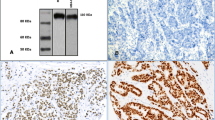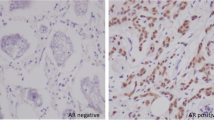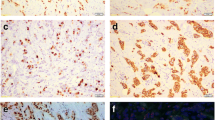Abstract
Purpose
Androgen receptor (AR) expression is frequent in breast cancer and has been associated with good prognosis in several studies. The present study investigates AR-expression in relation to molecular subtypes, clinicopathological features and prognosis in 1297 primary tumours and 336 paired axillary lymph node metastases (LNM) from two cohorts of Norwegian patients.
Methods
Immunohistochemistry for AR was performed on tumours previously reclassified into molecular subtypes using immunohistochemistry and in situ hybridisation. Associations between AR-expression and clinical features were studied using Chi-square tests. Cumulative incidence of breast cancer death and Cox regression analyses were used to assess prognosis.
Results
AR-positivity was found in 78.0% of all cases, 84.9% of luminal and 45.1% of non-luminal tumours. The highest proportion of AR-positivity was found in Luminal B tumours, and the lowest in the Basal phenotype. Discordance in AR-status between primary tumours and lymph node metastases was observed in 21.4% of cases. A switch from AR− primary tumour to AR+ lymph node metastasis was seen in 60/72 discrepant cases. AR-expression in primary tumours was an independent and favourable prognostic marker (HR 0.70, 95% CI 0.55–0.90), particularly in the Luminal A subtype, and in grade 3 tumours.
Conclusions
AR is an independent predictor of good prognosis in BC, particularly in grade 3 and Luminal A tumours. Discordant AR-expression between primary tumour and LNM was observed in 21.4% of cases and most often there was a switch from AR− primary tumour to AR+ axillary LNM.


Adapted from Breast Cancer Res Treat, 2013, Vol 140, Engstrøm et al, Molecular subtypes, histopathological grade and survival in a historic cohort of breast cancer patients [17] Fig. 2, p 466. Open access, permission for reprint not required



Similar content being viewed by others
Data availability
The datasets generated and/or analysed in the current study are not publicly available but are available from the corresponding author on reasonable request.
References
Lea OA, Kvinnsland S, Thorsen T (1989) Improved measurement of androgen receptors in human breast cancer. Cancer Res 49(24 Pt 1):7162–7167
Collins LC, Cole KS, Marotti JD, Hu R, Schnitt SJ, Tamimi RM (2011) Androgen receptor expression in breast cancer in relation to molecular phenotype: results from the Nurses’ Health Study. Mod Path 24(7):924–931
Grogg A, Trippel M, Pfaltz K, Ladrach C, Droeser RA, Cihoric N, Salhia B, Zweifel M, Tapia C (2015) Androgen receptor status is highly conserved during tumor progression of breast cancer. BMC Cancer 15:872
Bozovic-Spasojevic I, Zardavas D, Brohee S, Ameye L, Fumagalli D, Ades F, de Azambuja E, Bareche Y, Piccart M, Paesmans M et al (2017) The prognostic role of androgen receptor in patients with early-stage breast cancer: a meta-analysis of clinical and gene expression data. Clin Cancer Res 23(11):2702–2712
Hu R, Dawood S, Holmes MD, Collins LC, Schnitt SJ, Cole K, Marotti JD, Hankinson SE, Colditz GA, Tamimi RM (2011) Androgen receptor expression and breast cancer survival in postmenopausal women. Clin Cancer Res 17(7):1867–1874
Park S, Koo JS, Kim MS, Park HS, Lee JS, Lee JS, Kim SI, Park BW, Lee KS (2011) Androgen receptor expression is significantly associated with better outcomes in estrogen receptor-positive breast cancers. Ann Oncol 22(8):1755–1762
Gasparini P, Fassan M, Cascione L, Guler G, Balci S, Irkkan C, Paisie C, Lovat F, Morrison C, Zhang J et al (2014) Androgen receptor status is a prognostic marker in non-basal triple negative breast cancers and determines novel therapeutic options. PloS One 9(2):e88525
He J, Peng R, Yuan Z, Wang S, Peng J, Lin G, Jiang X, Qin T (2012) Prognostic value of androgen receptor expression in operable triple-negative breast cancer: a retrospective analysis based on a tissue microarray. Med Oncol (Northwood London England) 29(2):406–410
Tang D, Xu S, Zhang Q, Zhao W (2012) The expression and clinical significance of the androgen receptor and E-cadherin in triple-negative breast cancer. Med Oncol (Northwood London England) 29(2):526–533
Rakha EA, El-Sayed ME, Green AR, Lee AH, Robertson JF, Ellis IO (2007) Prognostic markers in triple-negative breast cancer. Cancer 109(1):25–32
Choi JE, Kang SH, Lee SJ, Bae YK (2015) Androgen receptor expression predicts decreased survival in early stage triple-negative breast cancer. Ann Surg Oncol 22(1):82–89
Curigliano G, Burstein HJ, Gnant EPW, Dubsky M, Loibl P, Colleoni S, Regan M, Piccart-Gebhart MM, Senn M et al (2017) De-escalating and escalating treatments for early-stage breast cancer: the St. Gallen International Expert Consensus Conference on the Primary Therapy of Early Breast Cancer 2017. Ann Oncol 28(8):1700–1712
Yu Q, Niu Y, Liu N, Zhang JZ, Liu TJ, Zhang RJ, Wang SL, Ding XM, Xiao XQ (2011) Expression of androgen receptor in breast cancer and its significance as a prognostic factor. Ann Oncol 22(6):1288–1294
Perou CM, Sorlie T, Eisen MB, van de Rijn M, Jeffrey SS, Rees CA, Pollack JR, Ross DT, Johnsen H, Akslen LA et al (2000) Molecular portraits of human breast tumours. Nature 406(6797):747–752
Sorlie T, Perou CM, Tibshirani R, Aas T, Geisler S, Johnsen H, Hastie T, Eisen MB, van de Rijn M, Jeffrey SS et al (2001) Gene expression patterns of breast carcinomas distinguish tumor subclasses with clinical implications. Proc Natl Acad Sci USA 98(19):10869–10874
Blows FM, Driver KE, Schmidt MK, Broeks A, van Leeuwen FE, Wesseling J, Cheang MC, Gelmon K, Nielsen TO, Blomqvist C et al (2010) Subtyping of breast cancer by immunohistochemistry to investigate a relationship between subtype and short and long term survival: a collaborative analysis of data for 10,159 cases from 12 studies. PLoS Med 7(5):e1000279
Engstrom MJ, Opdahl S, Hagen AI, Romundstad PR, Akslen LA, Haugen OA, Vatten LJ, Bofin AM (2013) Molecular subtypes, histopathological grade and survival in a historic cohort of breast cancer patients. Breast Cancer Res Treat 140(3):463–473
Nielsen TO, Hsu FD, Jensen K, Cheang M, Karaca G, Hu Z, Hernandez-Boussard T, Livasy C, Cowan D, Dressler L et al (2004) Immunohistochemical and clinical characterization of the basal-like subtype of invasive breast carcinoma. Clin Cancer Res 10(16):5367–5374
Cheang MC, Chia SK, Voduc D, Gao D, Leung S, Snider J, Watson M, Davies S, Bernard PS, Parker JS et al (2009) Ki67 index, HER2 status, and prognosis of patients with luminal B breast cancer. J Natl Cancer Inst 101(10):736–750
Cheang MC, Martin M, Nielsen TO, Prat A, Voduc D, Rodriguez-Lescure A, Ruiz A, Chia S, Shepherd L, Ruiz-Borrego M et al (2015) Defining breast cancer intrinsic subtypes by quantitative receptor expression. The Oncologist 20(5):474–482
Lips EH, Mulder L, de Ronde JJ, Mandjes IA, Koolen BB, Wessels LF, Rodenhuis S, Wesseling J (2013) Breast cancer subtyping by immunohistochemistry and histological grade outperforms breast cancer intrinsic subtypes in predicting neoadjuvant chemotherapy response. Breast Cancer Res Treat 140(1):63–71
Tsang JY, Ni YB, Chan SK, Shao MM, Law BK, Tan PH, Tse GM (2014) Androgen receptor expression shows distinctive significance in ER positive and negative breast cancers. Ann Surg Oncol 21(7):2218–2228
Qi JP, Yang YL, Zhu H, Wang J, Jia Y, Liu N, Song YJ, Zan LK, Zhang X, Zhou M et al (2012) Expression of the androgen receptor and its correlation with molecular subtypes in 980 chinese breast cancer patients. Breast Cancer 6:1–8
Shibahara Y, Miki Y, Sakurada C, Uchida K, Hata S, McNamara K, Yoda T, Takagi K, Nakamura Y, Suzuki T et al (2013) Androgen and androgen-metabolizing enzymes in metastasized lymph nodes of breast cancer. Human Pathol 44(10):2338–2345
Kim EY, Lee KH, Yun JS, Park YL, Park CH, Do SI, Chae SW (2017) Clinicopathologic significance of androgen receptor expression and discordant receptor status during progression in breast cancer. Int J Clin Exp Pathol 10(7):7929–7939
Kvale G, Heuch I (1987) A prospective study of reproductive factors and breast cancer. II. Age at first and last birth. Am J Epidemiol 126(5):842–850
Kvale G, Heuch I, Eide GE (1987) A prospective study of reproductive factors and breast cancer. I. Parity. Am J Epidemiol 126(5):831–841
Holmen J, Midthjell K, Krüger Ø, Langhammer A, Holmen TL, Bratberg GH, Vatten L, Lund-Larsen PG (2003) The Nord-Trøndelag Health Study 1995-97 (HUNT 2): objectives, contents, methods and participation. Norsk Epidemiol 13(1):19–32
Valla M, Vatten LJ, Engstrom MJ, Haugen OA, Akslen LA, Bjorngaard JH, Hagen AI, Ytterhus B, Bofin AM, Opdahl S (2016) Molecular subtypes of breast cancer: long-term incidence trends and prognostic differences. Cancer Epidemiol Biomark Prev 25(12):1625–1634
Lakhani S, Ellis I, Schnitt S, Tan P, Vijver, MVd (2012) WHO classification of tumours of the breast, 4 edn. International Agency for Research on Cancer (IARC), Lyon
Elston CW, Ellis IO (2002) Pathological prognostic factors in breast cancer. I. The value of histological grade in breast cancer: experience from a large study with long-term follow-up. C. W. Elston & I. O. Ellis Histopathology 1991; 19:403–410. Histopathology 41(3A):151–152, discussion 152–153.
Uhlen M, Fagerberg L, Hallstrom BM, Lindskog C, Oksvold P, Mardinoglu A, Sivertsson A, Kampf C, Sjostedt E, Asplund A et al (2015) Proteomics. Tissue-based map of the human proteome. Science 347(6220):1260419
http://www.proteinatlas.org/ENSG00000169083-AR/antibody#immunohistochemistry
Uhlen M, Bandrowski A, Carr S, Edwards A, Ellenberg J, Lundberg E, Rimm DL, Rodriguez H, Hiltke T, Snyder M et al (2016) A proposal for validation of antibodies. Nat Methods 13(10):823–827
Park S, Koo J, Park HS, Kim JH, Choi SY, Lee JH, Park BW, Lee KS (2010) Expression of androgen receptors in primary breast cancer. Ann Oncol 21(3):488–492
Niemeier LA, Dabbs DJ, Beriwal S, Striebel JM, Bhargava R (2010) Androgen receptor in breast cancer: expression in estrogen receptor-positive tumors and in estrogen receptor-negative tumors with apocrine differentiation. Mod Pathol 23(2):205–212
McShane LM, Altman DG, Sauerbrei W, Taube SE, Gion M, Clark GM (2006) REporting recommendations for tumor MARKer prognostic studies (REMARK). Breast Cancer Res Treat 100(2):229–235
Larsen IK, Smastuen M, Johannesen TB, Langmark F, Parkin DM, Bray F, Moller B (2009) Data quality at the Cancer Registry of Norway: an overview of comparability, completeness, validity and timeliness. Eur J Cancer 45(7):1218–1231
Dowsett T, Verghese E, Pollock S, Pollard J, Heads J, Hanby A, Speirs V (2014) The value of archival tissue blocks in understanding breast cancer biology. J Clin Pathol 67(3):272–275
Karlsson C, Karlsson MG (2011) Effects of long-term storage on the detection of proteins, DNA, and mRNA in tissue microarray slides. J Histochem Cytochem 59(12):1113–1121
Mirlacher M, Kasper M, Storz M, Knecht Y, Durmuller U, Simon R, Mihatsch MJ, Sauter G (2004) Influence of slide aging on results of translational research studies using immunohistochemistry. Mod Pathol 17(11):1414–1420
Moinfar F, Okcu M, Tsybrovskyy O, Regitnig P, Lax SF, Weybora W, Ratschek M, Tavassoli FA, Denk H (2003) Androgen receptors frequently are expressed in breast carcinomas: potential relevance to new therapeutic strategies. Cancer 98(4):703–711
Bauer KR, Brown M, Cress RD, Parise CA, Caggiano V (2007) Descriptive analysis of estrogen receptor (ER)-negative, progesterone receptor (PR)-negative, and HER2-negative invasive breast cancer, the so-called triple-negative phenotype: a population-based study from the California cancer Registry. Cancer 109(9):1721–1728
Bianchini G, Balko JM, Mayer IA, Sanders ME, Gianni L (2016) Triple-negative breast cancer: challenges and opportunities of a heterogeneous disease. Nature Rev Clin Oncol 13(11):674–690
Hu XQ, Chen WL, Ma HG, Jiang K (2017) Androgen receptor expression identifies patient with favorable outcome in operable triple negative breast cancer. Oncotarget 8(34):56364–56374
Elebro K, Bendahl PO, Jernstrom H, Borgquist S (2017) Androgen receptor expression and breast cancer mortality in a population-based prospective cohort. Breast Cancer Res Treat 165:645–657
Chae BJ, Lee A, Bae JS, Song BJ, Jung SS (2011) Expression of nuclear receptor DAX-1 and androgen receptor in human breast cancer. J Surg Oncol 103(8):768–772
Safarpour D, Pakneshan S, Tavassoli FA (2014) Androgen receptor (AR) expression in 400 breast carcinomas: is routine AR assessment justified? Am J Cancer Res 4(4):353–368
Gucalp A, Traina TA (2017) The androgen receptor: Is it a promising target? Ann Surg Oncol 24:2876–2880
Parker C, Gillessen S, Heidenreich A, Horwich A (2015) Cancer of the prostate: ESMO clinical practice guidelines for diagnosis, treatment and follow-up. Ann Oncol 26(Suppl 5):v69–77
Bonnefoi H, Grellety T, Tredan O, Saghatchian M, Dalenc F, Mailliez A, L’Haridon T, Cottu P, Abadie-Lacourtoisie S, You B et al (2016) A phase II trial of abiraterone acetate plus prednisone in patients with triple-negative androgen receptor positive locally advanced or metastatic breast cancer (UCBG 12–1). Ann Oncol 27(5):812–818
Gucalp A, Tolaney S, Isakoff SJ, Ingle JN, Liu MC, Carey LA, Blackwell K, Rugo H, Nabell L, Forero A et al (2013) Phase II trial of bicalutamide in patients with androgen receptor-positive, estrogen receptor-negative metastatic Breast Cancer. Clin Cancer Res 19(19):5505–5512
Traina TA, Miller K, Yardley DA, O’Shaughnessy J, Cortes J, Awada A, Kelly CM, Trudeau ME, Schmid P, Gianni L et al (2015) Results from a phase 2 study of enzalutamide (ENZA), an androgen receptor (AR) inhibitor, in advanced AR + triple-negative breast cancer (TNBC). J Clin Oncol 33(15_suppl):1003–1003
Koo JS, Jung W, Jeong J (2010) Metastatic breast cancer shows different immunohistochemical phenotype according to metastatic site. Tumori 96(3):424–432
Cimino-Mathews A, Hicks JL, Illei PB, Halushka MK, Fetting JH, De Marzo AM, Park BH, Argani P (2012) Androgen receptor expression is usually maintained in initial surgically resected breast cancer metastases but is often lost in end-stage metastases found at autopsy. Hum Pathol 43(7):1003–1011
Hattori Y, Yoshida A, Yoshida M, Takahashi M, Tsuta K (2015) Evaluation of androgen receptor and GATA binding protein 3 as immunohistochemical markers in the diagnosis of metastatic breast carcinoma to the lung. Pathol Int 65(6):286–292
Vera-Badillo FE, Templeton AJ, de Gouveia P, Diaz-Padilla I, Bedard PL, Al-Mubarak M, Seruga B, Tannock IF, Ocana A, Amir E (2014) Androgen receptor expression and outcomes in early breast cancer: a systematic review and meta-analysis. J Natl Cancer Inst 106(1):djt319
Qu Q, Mao Y, Fei XC, Shen KW (2013) The impact of androgen receptor expression on breast cancer survival: a retrospective study and meta-analysis. PloS ONE 8(12):e82650
Honma N, Horii R, Iwase T, Saji S, Younes M, Ito Y, Akiyama F (2012) Clinical importance of androgen receptor in breast cancer patients treated with adjuvant tamoxifen monotherapy. Breast Cancer 20(4):323–330
Wang C, Pan B, Zhu H, Zhou Y, Mao F, Lin Y, Xu Q, Sun Q (2016) Prognostic value of androgen receptor in triple negative breast cancer: A meta-analysis. Oncotarget 7(29):46482–46491
Peters AA, Buchanan G, Ricciardelli C, Bianco-Miotto T, Centenera MM, Harris JM, Jindal S, Segara D, Jia L, Moore NL et al (2009) Androgen receptor inhibits estrogen receptor-alpha activity and is prognostic in breast cancer. Cancer Res 69(15):6131–6140
Acknowledgements
The authors thank the Department of Pathology, St. Olav’s University Hospital, Trondheim, Norway, for making the archives available for the study, the Cancer Registry of Norway for providing the patient data, and senior biomedical engineer Borgny Ytterhus and biomedical engineer Anette Hansen Skjervold MSc, NTNU for excellent technical assistance.
Funding
Funding was provided by the Liaison Committee for Education, Research and Innovation in Central Norway, The Central Norway Health Authority (Project Number: 46030001).
Author information
Authors and Affiliations
Corresponding author
Ethics declarations
Conflict of interest
The authors declare that they have no conflict of interest.
Ethical approval
All procedures performed in studies involving human participants were in accordance with the ethical standards of the institutional and/or national research committee and with the 1964 Helsinki declaration and its later amendments or comparable ethical standards. Approval for this study, including dispensation from the requirement of patient consent, was granted by the Regional Committee for Medical and Health Sciences Research Ethics (REK, Midt-Norge, Ref. nr: 836/2009).
Electronic supplementary material
Below is the link to the electronic supplementary material.
Rights and permissions
About this article
Cite this article
Kraby, M.R., Valla, M., Opdahl, S. et al. The prognostic value of androgen receptors in breast cancer subtypes. Breast Cancer Res Treat 172, 283–296 (2018). https://doi.org/10.1007/s10549-018-4904-x
Received:
Accepted:
Published:
Issue Date:
DOI: https://doi.org/10.1007/s10549-018-4904-x




